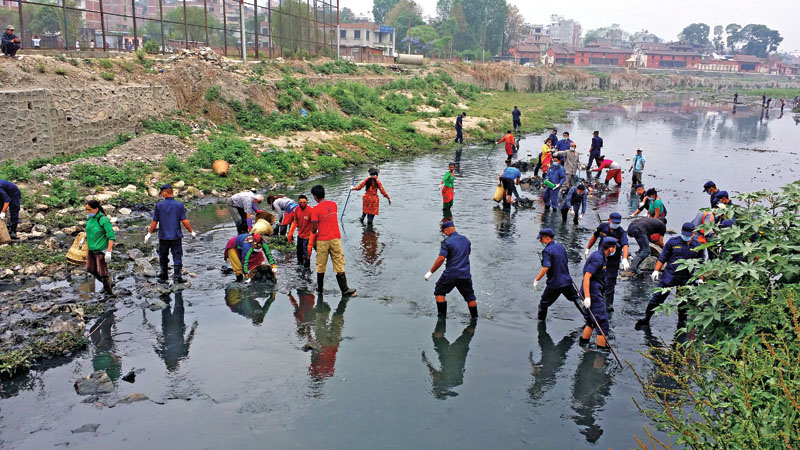'Restore glory of the Bagmati River'
Kathmandu, March 10
The Bagmati River, which is revered as a source of Nepali civilisation and urbanisation, has been facing a severe environmental crisis due to massive pollution in recent years.
The Bagmati Clean Up Campaign, which is underway since May 2013, is just a temporary solution to preserve the river with the richest historical significance, cultural experts and historians point out.
Madan Bhatta, head priest at Pashupatinath temple, said the annual Bagmati pilgrimage along the river, which has several temples on its banks, from Sundarijal to Chovar has become a thing of the past. "Because of the piles of garbage in the river and encroachment on its banks, the Bagmati yatra has been stopped. This campaign gives hope of revival of such practices which have both religious and cultural significance," explained the priest.
The river pollution dates back to the regime of Juddha Shumsher when the mixing up of sewage into the river started. Adding to it was the encroachment of the land near the river bank, which began during the Panchayat era, when the right to buy and sell the land commenced. "The building of houses near the river and poorly managed drainage system are the leading causes of pollution of Bagmati," informed Bhatta.
The arterial river, on which the Kathmandu Valley thrived for generations, needs to be properly restored to its original value, stresses cultural expert Padam Shrestha in his book 'Nepal Mandal Sampada'. "For the protection of the Bagmati Valley Civilisation, Bagmati River must be preserved," in the words of the Hut Ram Baidhya, First Agricultural Engineer of Nepal, in the book.
The Bagmati River covers 360 km in length and 630 km in width of the Kathmandu Valley. Different 13 rivers such as Bishnumati, Manahara, Hanumante, Bhatakhusi, Tukucha, Dallu, and Bakhu River originated from the Bagmati.
Worried that the clean up efforts are merely superficial, Padam Shrestha suggested that cleaning of river permanently, construction of buildings on the river banks and mixing of sewage must be stopped immediately.
"The campaign was started to reduce the pollution of river but it has no long term plan to protect the river and the heritage sites on its banks," Shrestha said.
Another culture expert, Satya Mohan Joshi, said the drainage system near the river should be controlled to effect real change. The drainage must be refined before mixing into the river.
200 weeks of clean-up drive
Kathmandu, March 10
It has been 200 weeks since the Bagmati River clean-up campaign began on May 19, 2013. To celebrate the longest river cleaning campaign in the country, the government is going to clean the river tomorrow by gathering at least 100,000 people across the river banks in 18 places from Sundarijal to Sundarighat.
According to the organising committee, participants will gather in Sundarijal, Bhadrabas Floriculture, Gokarna, Jorpati, Gothatar, Guheshwori, Pashupati, Tilganga, Sinamangal, Minbhawan, Mahadevsthan, Shankhamul, Dhobikhola, Thapathali, Teku, Balkhu, Sundarighat and Chovar at 7:00am tomorrow to clean the Bagmati River.
Raju Adhikari, a member of the committee, said that a walkathon would also be held as part of the programme. "After the cleaning and walkathon, participants will gather at Shankhamul at 9:30am for a event where Prime Minister Pushpa Kamal Dahal will address the crowd," Adhikari informed The Himalayan Times. "Our target is to bring in at least 100,000 people at once for cleaning and walkathon to mark this special occasion."
The committee was formed under Chief Secretary Somlal Subedi to mark the 200th week of the Bagmati Clean-up Campaign on first week of February. On the occasion of 100th week, 150,000 people made a human chain on the banks of the river.
According to campaign volunteers, there is a core team of 50 members who ritually clean up the Bagmati River every Saturday. Since the campaign began, over 7,200 metric tonnes of garbage has been taken out from the river and over 520,000 people have joined the campaign. The High Powered Committee for Integrated Development of the Bagmati Civilisation is constructing 22 gardens on the banks of the Bagmati River.
The campaign was brought together by five main organisations. Currently, over 140 groups claim to be working on the Bagmati Cleaning Project.






